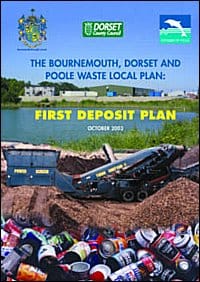A partnership of Dorset county council, the Borough of Poole and Bournemouth borough council have begun a six-week public consultation of their Waste Local Plan covering the period up to 2016.
 Dorset councils are keen to hear the public view on their new Waste Local Plan |
The Plan incorporates the three municipal waste strategies of the councils and lays a framework for dealing with about 820,000 tonnes of commercial and industrial waste and 420,000 tonnes of municipal waste each year.
Dorset has some of the highest recycling rates in the country, recovering about 27% of household waste through recycling and composting schemes. Commercial and industrial recycling rates are at about 41%.
But with waste arisings growing by 3.5% each year and government targets to recycle or compost 40% of household waste each year by 2005-06, the three councils see new waste recovery technologies as the way forward.
The Plan identifies a need for 485,000 tonnes a year of extra recovery facilities, forecasting a need to recover a total of 5.5 million tonnes of the 12 million tonnes of non-inert material that will be produced in the county from now until 2016.
MBT
In a report accompanying the Plan, Dorset county council's head of waste management, Adrian Poller, indicated that three MBT plants will be needed, each processing about 80,000 tonnes of municipal waste and 40,000 tonnes of commercial/industrial waste a year.
Mr Poller said: “If waste growth over the next 20 years is similar to waste growth over the last 20, then we will need three plants before 2020, even if we hit or slightly exceed 40% recycling and composting. However, we have made a commitment in the strategy to tackle waste growth and this is now an emerging priority of both the UK government and the EU as well. If we can get to grips with waste growth, we may not have to build the third plant, and may be able to build the second plant later than expected.”
Of the 120,000 tonnes of material each plant would take in each year, Mr Poller revealed that about 40,000 tonnes would be landfilled after treatment. However, the five-week MBT composting process would “reduce the waste’s ability to produce methane once landfilled by up to 95%”, he said.
About 4,000 tonnes of metal would be removed for recycling from each facility, with 2,000 tonnes of ash produced by burning refuse-derived fuel (RDF) made from the rest of the material.
The burning of RDF at each plant could generate about 4MW of power for export to the national grid – enough to power 800 homes. Mr Poller said that at 12.5 – 14 MJ/Mg, the RDF “does have a calorific value better than low-grade coal and it therefore makes sense to try to recover the energy value from it”.
Ideally, Dorset county council believes the first MBT plants should be commissioned by late 2008 to meet the 2009-10 Landfill Directive target, with a second plant commissioned in late 2011.
Sites
The three Dorset councils are also considering the use of anaerobic digestion and in-vessel composting as part of their municipal waste strategies, and the new joint Plan identifies the need for new materials recycling facilities and waste transfer stations. Overall, the Plan states that between five to 10 new sites will be needed, and preliminary investigations have identified 13 possible sites.
Although some form of thermal treatment has been proposed for the Hatchpond Depot site in the Borough of Poole, the Plan all but rules out the use of large, “mass burn” incinerators.
It states: “The hierarchy of waste management indicates that all opportunities for recycling should be explored before recovery of energy via incineration is considered. Proposals for large-scale plants are therefore unlikely to be acceptable.”
The consultation on the Bournemouth, Dorset and Poole Waste Local Plan will now run until November 7, 2003. It will be re-published following revision after the consultation in 2004, with a full public inquiry expected to be held in January 2005. The Plan is scheduled to be adopted in winter 2005.
For more information on the Bournemouth, Dorset and Poole Waste Local Plan, visit the Dorset county council website.











Subscribe for free